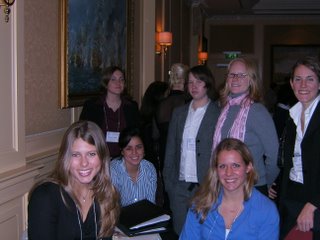
The students taking my "Global Leadership" seminar (pictured above) attended the ILA conference with me. I asked them to attend the four keynote speakers and at least six of the nine program times available for papers, workshops, etc. Our ongoing seminar met tonight and we discussed what they discovered from their experiences at ILA.
The first question was, "What ideas about leadership were confirmed by what you saw and heard at the conference?" The answers fell into six areas. One student noted that the focus on service leadership reinforced notions that she had always embraced. In the service (or servant) leadership model, the focus of the leader is to serve first, letting the role of leading emerge from the commitments among leaders and collaborators working together. Another student drew from one of the keynote speakers, Kumi Naidoo (Secretary General and CEO, CIVICUS), who included a story about a boyhood friend who was jailed with him during the South African resistance movement. As Kumi left his friend after a period of incarceration as a fifteen year old, he commented that the ultimate in leadership must be to give one's life to the cause. The friend said, "No, it isn't to give it away but to live for your convictions." Within days afterward, the friend's life was taken by authorities attempting to quel the resistance. Another student found confirmation in presentations that identified different standards and expectations between men and women; to have others recognize what she has experienced helped her to realize she was not alone. Yet another student drew from one of the other keynote speakers, Manfred Kets de Vries (Professor of Leadership Development and Director, Global Leadership Centre, INSEAD, France) who ended his remarks by reinforcing that life and leadership is a journey, not a destination. Finally, a couple of students noted that they struggled with the unexamined privilege of many of the participants from the U.S.A. There were numerous examples where a U.S.A. presenter would make reference to "us" or "here" and it was obvious that they meant "Americans" (as if all in the room were from one country) and that, in fact, the meeting was in North America. The sensitivity acquired from studying at MUDEC helped Miami students be more aware of this potentially offensive bias.
The second question we explored was, "What were the surprises that challenged your perspectives about leadership?" The first challenge was a woman student who was surprised that there is a lot of evidence in the research on leadership that women's leadership behaviors are more effective than men's. Examples are that women are frequently more attentive to quality control, customer satisfaction, relationships in the workplace, processes, and that women are inherently more dedicated to transformational leadership purposes. This realization led to the insight that men and women have different gifts that they bring to leadership and that the key is making sure that all of these talents bring benefit to the organizations men and women serve. Another surprising insight came from a presentation that explored surface versus deep action in leadership. This presentation addressed what happens when leaders are involved in crises. When in the midst of the crisis, leadership may operate more at the surface because to deeply recognize the tragedy may be more than the individual can handle while still attempting to serve others who need leadership throughout the organization. The final surprise was not about the content of leadership studies or development but about the way the ILA conference attendees conducted themselves during the conference. From students' perspective, the degree of true dialogue and discourse was minimal, which students believed hindered participants in learning as much as they could.
All in all, the students enjoyed and gained a great deal from attending ILA. It is a tribute to Miami students that they were comfortable enough to utilize critical thinking and reflection insights to make sense of what they heard. We will continue to explore the insights gained from ILA as we look at some of the most prominent reserachers and theorists in leadership studies.
No comments:
Post a Comment